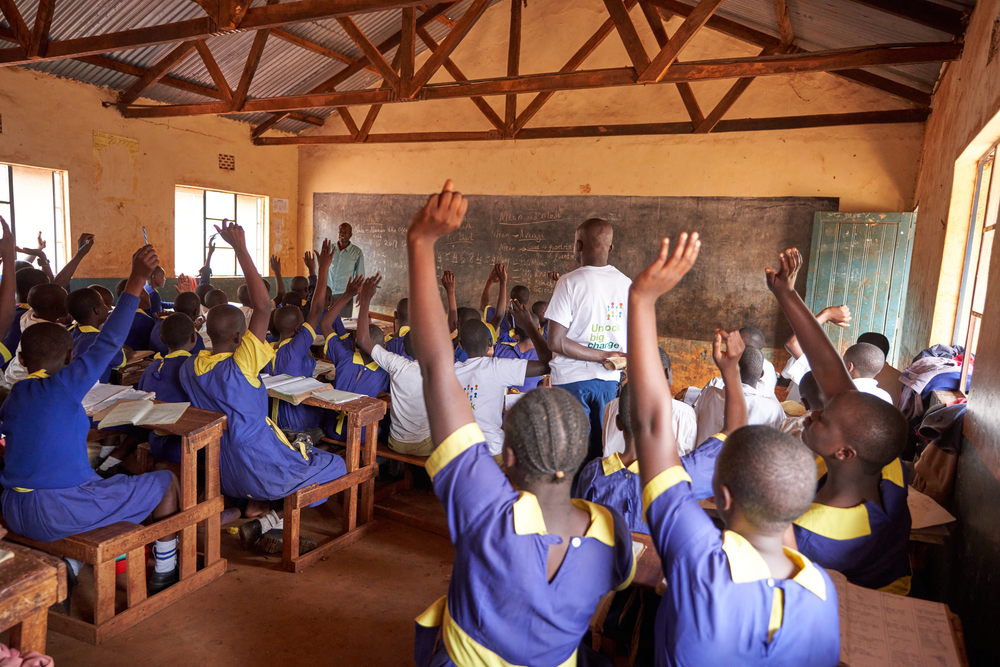
More quality education means more equality for the world’s children
Education funding, Education in emergencies, Girls' education, Right to education, Teachers and learning
As world leaders meet at the World Economic Forum in Davos, 2018 is shaping up as a key year for the future of education and employment skills.
For many people, the world right now seems more chaotic and on edge than it has done for decades.
Conflicts and long-running refugee crises rage. Unrest and extreme views abound. Poverty and persecution persist.
Leaders from the worlds of politics, business and civil society are gathering this week in Davos, Switzerland, to try to unravel some of those issues.
The theme of the 2018 World Economic Forum annual meetings is “Creating a shared future in a fractured world”.
The solutions to many of our social and economic problems lie in education, said Justin van Fleet, Director of the Education Commission and Senior Advisor to Theirworld, who is in Davos.
He added: “To make a shared future a reality, we must dramatically expand access to education. And not just any education but a quality education.”
More than 260 million children and youth are out of school. And half the world’s children face leaving school without the basic skills they need for the jobs of the future.
Van Fleet argued in a blog that education is the best way to prepare young people to be knowledgeable, adaptable and ready to participate as global citizens.
This is a critical year for the future of education. Next week sees a major funding conference for the Global Partnership for Education, which works in the world’s poorest countries. United Nations agencies also need their education work financed, as does the Education Cannot Wait fund for schooling in humanitarian emergencies.
Then the G20 countries have the opportunities to see in the new International Finance Facilty for Education that could unlock $10 billion a year to help get millions of children into school.

“Starting with Davos, we can make 2018 the year where collaboration – especially around education - will help us shape a world where equality reigns supreme,” said van Fleet.
Sarah Brown, President of Theirworld and Executive Chair of the Global Business Coalition for Education, is also in Davos this week. She said: “World leaders are cheering an upturn in global growth – but we know from history that this doesn’t trickle down to those who need it the most.
“The focus needs to be on how we urgently invest in what young people need to equip themselves with the skills and learning to thrive.
“This means investing in the ‘bookends’ of learning that are woefully missing – the skills young people need now and the investment needed in the early years so children are ready to learn and thrive.
“For this we need creativity, innovations in financing, embracing new technology for all, not just a few. Without this we let young people down and the result is poor education, poor health and lack of opportunities.”
A report released by the charity Oxfam to mark the start of the Davos meetings revealed that 42 people are as wealthy as 50% of the entire global population combined. 82% of wealth generated last year across the world went to the richest 1%.
Mark Goldring, Oxfam GB Chief Executive, said: “Leaders should ensure that wealthy individuals and businesses pay their fair share of tax by cracking down on tax avoidance – and invest this into essential services like schools and hospitals, and creating jobs for young people.”
Business leaders will be told at Davos this week that boys in developing countries are more likely to want to become doctors, teachers and engineers than those in the United Kingdom.
The careers charity Education and Employers surveyed 20,000 primary schoolchildren in 20 countries and found British boys wanted to be footballers or YouTube stars. But medicine and teaching is the aim of boys in Zambia and Uganda.
In Uganda and the Philippines, girls most want to be teachers. In Pakistan, Bangladesh, Colombia and Indonesia they want to be doctors.
More news

Skills for the future give young people the best chance of success
